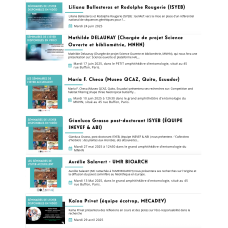Romain Nattier de l’ISYEB

ISYEB

ISYEB
Évolution des régimes alimentaires chez les Coccinelles / Evolution of food preferences in ladybird beetles
Le séminaire est disponible ici : https://youtu.be/TradGRq2HxA
In recent years, our understanding of the higher systematics and evolution of the emblematic ladybird beetle family (Coccinellidae) has benefited from a wealth of molecular studies, some of which led to major taxonomic changes. Yet, to advance our knowledge of the evolution of this group, we still lack comprehensive molecular studies focusing either on the whole family or on specific tribes. In this study, we reconstruct the most densely-sampled molecular phylogeny for the second most diverse tribe of Coccinellidae, the Coccinellini. We analyze a dataset consisting of five nuclear and three mitochondrial gene fragments across 150 taxa (including 105 ladybird beetle species, of which 88 belong to the Coccinellini) to provide a detailed phylogenetic framework for the tribe, along with estimates of divergence times using Bayesian relaxed clocks and primary fossil calibrations and an assessment of the evolution of feeding habits. The results of phylogenetic analyses provide strong support for the monophyly of the tribe and highlight the existence of four major clades. Almost all sampled Coccinellini genera (30 out of 34) are also recovered monophyletic. Our dating analyses yield age estimates that fall between estimates made by previous studies, suggesting a Early Cretaceous origin for the family Coccinellidae at c. 140 millions years ago (Ma), and a Late Cretaceous origin for the tribe Coccinellini at c. 83.8 Ma. Ancestral character state estimation of feeding habits also highlights a high level of phylogenetic niche conservatism on aphids and indicates that the most common recent ancestor of Coccinellini was likely feeding on aphids. Our results allow us to discuss the diversification of Coccinellini with respect to the diversification of aphids, which constitute their main diet; both the comparison of age estimates, the assessment of the evolution of feeding habits, and a discussion of the aphid fossil record suggest that the diversification of Coccinellini paralleled that of aphids’ main lineages. Our phylogenetic framework also provides additional insights into the evolution of the tribe’s feeding preferences, indicating a dynamic pattern in terms of variation in host-breadth and trends for a few specialized lineages that do not feed on aphids.



